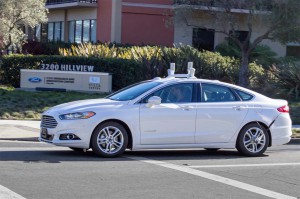
Google and several automakers expressed concern about California's proposed testing rules for self-driving cars.
As Tesla’s Elon Musk announced all of the maker’s new vehicles will be capable of Level 5 autonomous driving, other automakers were expressing their concerns about the state of California’s proposed rules for testing self-driving vehicles in the Golden State.
During a public hearing outlining the proposed rules Google and several automakers objected to a variety of mandates, claiming that they would hinder the ability to conduct effective testing, including requiring compliance with the guidelines that federal regulators made voluntary last month.
The U.S. Department of Transportation’s new Automated Vehicle Policy was devised to insure that automated vehicles or vehicles that can take over some or all of the driving task can pass a series of uniform tests to ensure the safety of the public, according to information supplied by The White House.
As part of the policy, the administration plans to offer what it describes as “vehicle performance” for manufacturers, developers, and other organizations outlining a 15-point “Safety Assessment” for the safe design, development, testing and deployment of highly automated vehicles, including a request that automakers sign and submit this safety assessment to certify that their vehicles are ready for public roads.
(Click Here for details on the new federal guidelines.)
The state’s approach “could greatly delay the benefits that self-driving vehicles can bring to safety and mobility for individuals,” said David Strickland, who heads the Self-Driving Coalition for Safer Streets that includes Google, Ford, Lyft, Uber Technologies Inc. and Volvo Car Group, according to Reuters.
Some of the objections include:
- Requiring a new autonomous vehicle data recorder and what data they would be required to test
- A 12-month delay between testing a vehicle and deploying it on public roads.
- Allowing police access to any self-driving data within 24 hours without seeking a warrant or subpoena.
- Generating a year of driverless testing data before applying for an operating permit
Automakers are really involved in this process because what happens in California is often sets the bar for other states. While the proposals may have set off the automakers, California officials are reminding that these are proposals and automakers should come to the table with ideas and plans of their own rather than suggesting something doesn’t work.
(Feds take first step toward ushering in the “third transportation revolution.” Click Here for the story.)
Brian Soublet, deputy director of the California DMV, said the department will be considering potential changes during the next several months; however, he did not provide a timetable for finalizing the rules.
“The goal is making sure that we can get this life-saving technology out on the streets,” Soublet said to Reuters.
One proposal that is certain to make Google happy is the allowance for the absence of a human driver and a steering wheel in advanced self-driving cars. Previously, California proposed to require licensed drivers and controls in autonomous cars. However, there is one potential rule that has most of the makers worked up.
(For more on the Tesla autonomous vehicle announcement, Click Here.)
Ron Medford, director of safety for Google’s self-driving car project, told Reuters that the proposal to require manufacturers to obtain local approval is “unworkable” as it may prevent manufacturers from testing a vehicle that can travel from one municipality to another.


One of the few times I agree with California.